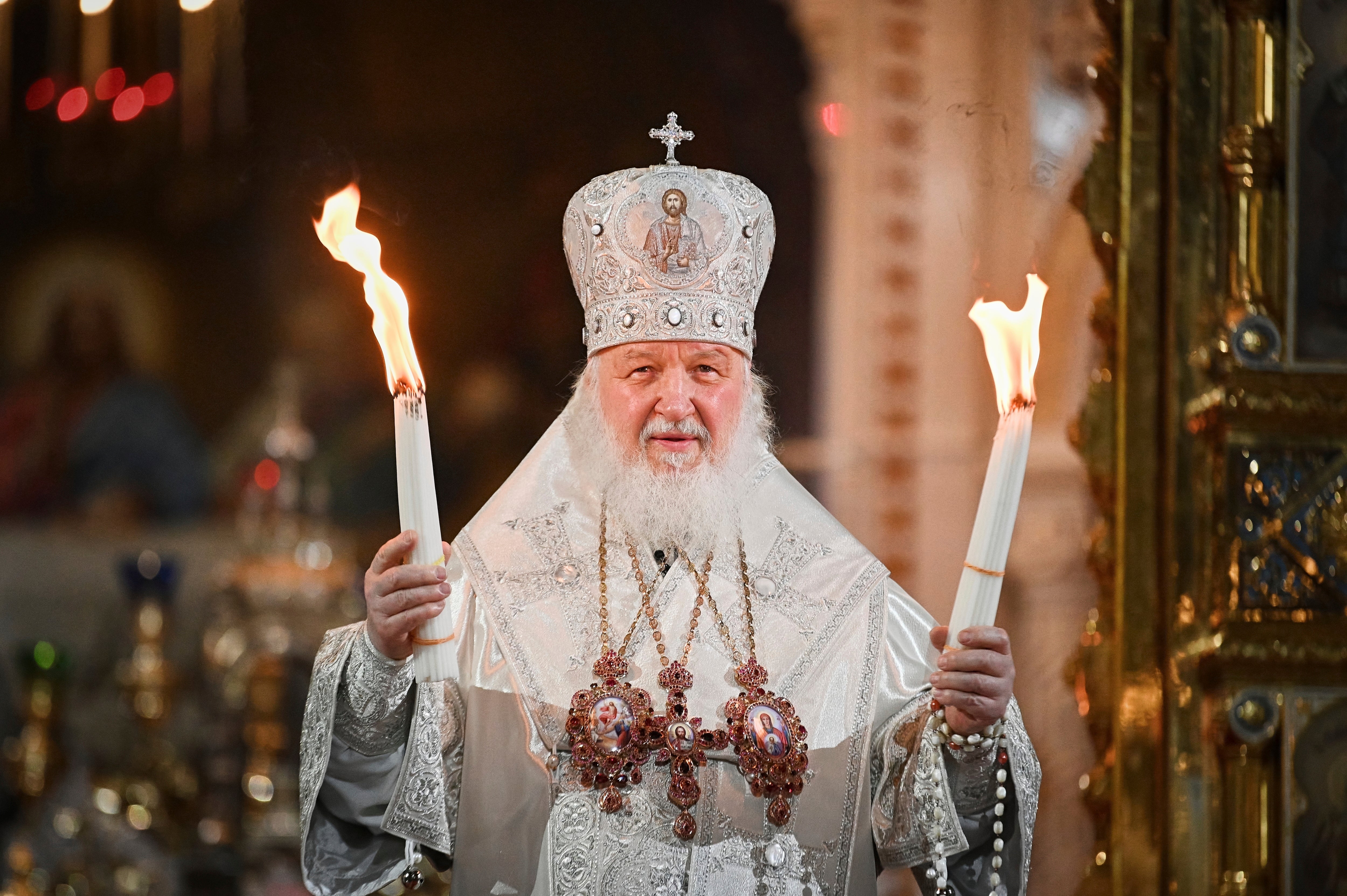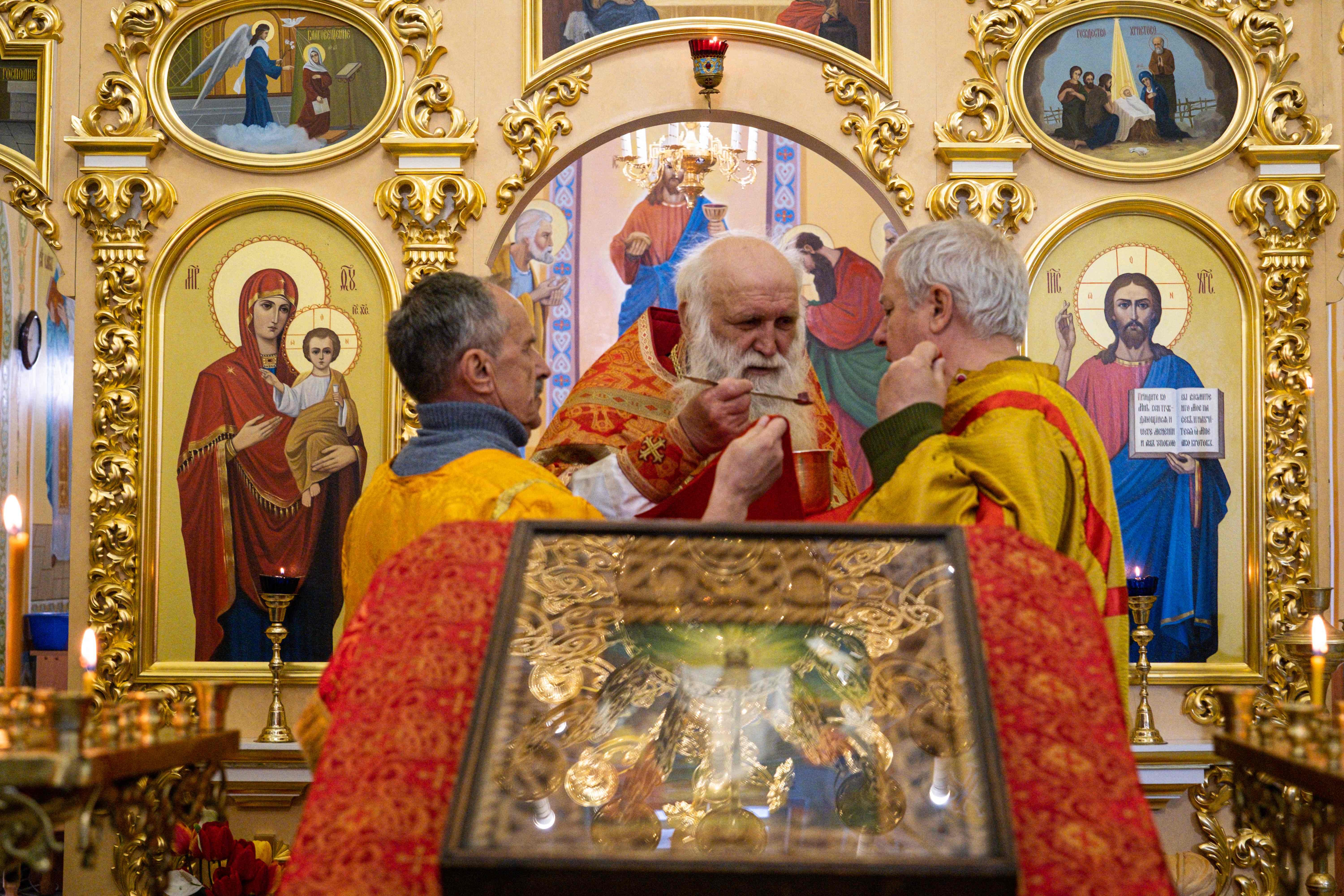Divisions appear in Russian Orthodox Church over its support for Putin’s war in Ukraine
Patriarch Kirill, the leader of the church, refuses to speak out against Vladimir Putin’s war in Ukraine. Now, many of the denomination’s parishes are considering whether to break from Moscow, reports Rory Sullivan


On the holiest day in its religious calendar, the Russian Orthodox Church was struggling under the weight of its own contradictions.
As its congregations gathered for Orthodox Easter services around the world on Sunday, many questioned their loyalty to the church as never before, pained by its stance on the war in Ukraine.
Instead of urging peace, Patriarch Kirill, the leader of the Moscow Patriarchate and, by extension, the Russian Orthodox Church, has actively voiced his support for the conflict.
In a sermon in early March, the 75-year-old, who is a trusted Kremlin ally, appeared to justify the Russian invasion on theological grounds. “We have entered into a struggle that has not a physical, but a metaphysical significance,” he said.
Like Mr Putin, Patriarch Kirill is a proponent of the Russkiy Mir (“Russian World”) doctrine, a type of ethnic nationalism. He talks of Russians and Ukrainians as “one people” and calls for their “reunification”.
For many of his flock, his views are incompatible with Orthodox Christian teachings. As a result, parishes in Ukraine and elsewhere are considering whether to formally break with Moscow.
The Russian Orthodox parish of Saint Nicholas of Myra in Amsterdam has already done so. Last month, its members voted by the necessary two-thirds majority to switch their allegiance to the Ecumenical Patriarchate of Constantinople.
Reverend Dr Michael Bakker, a theological scholar who serves as one of its priests, told The Independent: “I think we were probably the first parish of the Moscow Patriarchate outside Russia which moved away.”
“What precipitated everything was the war. We were appalled that Patriarch Kirill did not call for peace. Moreover, it was clear that he was supporting the conflict, and for us this was unacceptable.”
“It was not a great act of bravery on our part, it was our conscience dictating that we had to speak out,” he added.
Dr Bakker believes more parishes will follow suit. However, he explained that the make-up of certain congregations precludes this possibility. “Some of them are dominated by ethnic Russians, who feel very attached to the regime and to the Moscow Patriarchate. Here we have 20 nationalities and are a very open parish.”
In western Ukraine, the Holy Resurrection New Athos Monastery in Lviv has also moved away from the Moscow Patriarchate, deciding to join the Orthodox Church of Ukraine instead.
Dmytro Horyevoy, director of Ukraine’s Religious Security Centre, noted that such a move was “not common” in the country, with many churches still unsure of their next steps.
That is not to say Russian Orthodox Christians in Ukraine are happy with the status quo. Father Andriy Kobetiak, who still formally belongs to the Moscow Patriarchate, is among those who want to cut ties with it.
The priest had hoped Kirill would speak as a Christian in defence of peace. “The patriarch not only does not oppose, but openly blesses the Russian army to go to Ukraine and exterminate the Ukrainian people,” he said.
Although no bishop has yet indicated a desire to split with the Russian Orthodox Church, Father Kobetiak said the clergy and the faithful in Ukraine sought “spiritual independence”, mentioning how one priest is now serving “a half-ruined cathedral without a flock” in an area under siege.
“The main task I can see for now is to stay a human and find a way to separate from the Moscow Patriarchate.”
As well as aiming to leave the denomination, he would like to see Patriarch Kirill stripped of his position. Father Kobetiak therefore signed a letter with 439 other Russian Orthodox priests asking the Synod to hold a tribunal against him.

He said he has “minimal hopes” that Kirill will actually be toppled, citing the silence of leading Orthodox figures about the Ukraine war. However, he hoped the letter will at least give the issue more exposure.
Father Andriy Pinchuk, who started the petition, said it was “practically impossible to predict” what will happen with a potential tribunal.
“But even if it is at least a condemnation of the concept of ‘Russian World’, it will be a victory,” he said.
“And even if that doesn’t happen, it’s a victory already, because 440 Orthodox priests raised their heads and said they didn’t agree with the Moscow Patriarch’s gangster policy.”
Dr Brandon Gallaher, a theologian at the University of Exeter and former Russian Orthodox priest, co-authored another declaration denouncing the Moscow Patriarchate’s role in backing Mr Putin’s war. More than 1,000 Eastern Orthodox scholars have signed it so far.
“The Kremlin provided the guns for this war, but the church provided the ideas,” he said, explaining that the church had played a central role over the past two decades in hardening Russian nationalism.
“We wanted to say there is no place for this in Orthodoxy. It is an abomination, it is heresy,” he said. The Moscow Patriarchate has yet to respond to The Independent’s request for comment on this claim and for its view on the schisms within its denomination.
Dr Gallaher, however, sees the chance of Patriarch Kirill being removed from office as low. “I don’t know how it would happen, it would have to be an Easter miracle,” he said, commenting that it has rarely happened in the past.
There are also growing demands that the whole church be punished and ostracised from the World Council of Churches (WCC) due to its position on the invasion.
Peter Prove, the WCC’s director of international affairs, said the matter was a decision for the organisation’s member churches. None of them have launched a complaint yet, but many “very senior” church leaders have done so individually, he added.
Even if the WCC’s governing bodies were to approve the suspension, the Russian Orthodox Church would only be cast out after extensive dialogue, he said.
Despite avoiding any overt criticism, Mr Prove implied the Moscow church had fallen foul of its Christian duties. “I think, as [the former archbishop of Canterbury] Dr Rowan Williams has put it, that many of us around the world, myself included, are looking for something recognisably Christian to be said by the leadership of the Russian Orthodox Church.
“Having said that, we’re very aware of the limitations and constraints under which the Russian Orthodox Church – and many other churches – have had to work in situations of great political difficulty, in particular under authoritarian regimes.”
Dr Cyril Hovorun, a well-known Ukrainian theologian and former high-ranking Moscow Patriarchate official, is quicker to judge his own church’s shortcomings.
For many years, he played a large role in managing its external church relations. He undertook this work back in his home country between 2007 and 2009, before Kirill was made patriarch and asked him to move to Russia.
Dr Hovorun, who acted as a theological adviser to the church leader, said he became acutely aware of the “rapid development of the doctrine of the ‘Russian World’” and cautioned against its potential dangers.
“Now it is like a monster. But at the time it was like a baby in the cradle cooing – it was very small.”
“I warned Patriarch Kirill it would be disastrous for the church, for Ukraine and for himself. But he didn’t listen,” he added, speaking of the episode that prompted his resignation in 2012. He later moved to the US to teach at Yale University.
Over the intervening decade, he has used his academic platform to highlight the threat posed by the Moscow Patriarch’s ethno-religious teachings. He remains part of the church, arguing that it is best to oppose Kirill from within.
He is under no illusions about his former boss. “This is a growing consensus – including among Ukrainians who are members of the Moscow Patriarchy – that Kirill is to be blamed to a great extent for this war.”
For Dr Hovorun, this Orthodox Easter was different from previous ones. Since there was sadness instead of the usual joy, many parishioners had to reconsider their take on Easter, he said.
“At a time when they are meant to celebrate its joy, they know that people are dying, are being raped and are being tortured in Ukraine.
“For many people in Ukraine, Russia and elsewhere, this Easter is much more about Good Friday – the suffering of Christ – than the resurrection.”






Join our commenting forum
Join thought-provoking conversations, follow other Independent readers and see their replies
Comments